Bias is always part of being Muslim on campus. Now students face consequences for speaking up.
In dozens of interviews, students count the cost of condemning Israel’s role in the crisis.
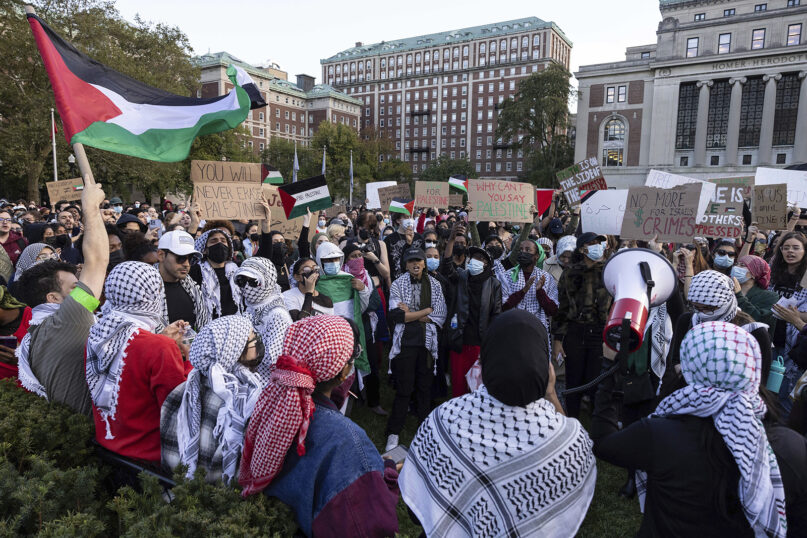
Pro-Palestinian demonstrators gather for a protest at Columbia University, Oct. 12, 2023, in New York.
(AP Photo/Yuki Iwamura)
October 25, 2023
By Dilshad Ali
(RNS) — At Columbia University in New York, a student who is also employed by the university received phone calls from her dean threatening to fire her and rescind her much-needed stipend for vocally supporting Palestinians the past two weeks.
In California, a Palestinian American student shared with me stories of Muslim students being harassed at the University Town Center in San Diego, particularly women wearing hijab or those wearing the patterned headscarf known as a kaffiyeh. The student, who is in her fourth year at the University of California, Irvine, said classmates who publicly support Palestine were physically attacked at UCLA.
At the University of Michigan, which has a sizable Arab, Middle Eastern and North African (MENA) and Muslim student population, some faculty say their Arab and Muslim students are fearful of a backlash. Charlotte Karem Albrecht, an associate professor of American culture and women’s studies at the school and core faculty member for Arab and Muslim American studies, told me that Arab, Palestinian, MENA and Muslim student leaders are also receiving reports of harassment, threats and ethnic intimidation and experiencing it themselves.
“Students wearing kaffiyehs (are) yelled at, surrounded in public spaces when they’re alone. Muslim women students who wear hijab (are) worried about walking alone in public spaces,” Karem Albrecht told me. “Some of these come from actual experiences these students are having, and some are (fears) coming from the discourses being had and the things they are hearing, like the young boy (6-year-old Wadea Al-Fayoume) who was killed (near Chicago).
RELATED: For what crime did Wadea Al-Fayoume, a 6-year-old in Chicago, die?
“It’s a real fear born of consequences,” she said.
Meanwhile, at George Mason University in Virginia, a female student shared that police officers were being “super aggressive” with Muslim, Palestinian and Arab students at campus protests. “I was just standing, watching the protest happening, but (I got) arrested … for being a part of the group.” She was later let go but reported being stopped at a traffic stop and having her vehicle checked because she looked suspicious.
As I put out a call out for Palestinian, Muslim and Arab students at American colleges and universities to share their fears and reports of harassment, intimidation and targeted hate, the stories came pouring in. Jewish students also report feeling afraid and isolated on college campuses across the country, according to this Washington Post article.
All these students (and more) who shared their stories with me did so under the promise of anonymity, fearing further harassment and hate and possible targeting.
In the days after the Oct. 7 attack by Hamas, many universities and colleges issued statements denouncing the militant Palestinian group, reaching out to Jewish students and standing in support of Israel. Most often there was no mention of Palestinian or Muslim students. As Gaza became a humanitarian crisis, with more than 6,000 killed to date, more than 2,000 of them children, the lukewarm, or complete lack of, acknowledgment of Palestinian pain or what Muslim, Palestinian and Arab students are enduring created an atmosphere of fear, hurt, grief and anger.
On Oct. 7, a statement went out to the University of Michigan community from President Santa J. Ono condemning the attack by “Hamas terrorists on Israeli citizens and the immense loss of civilian lives” and affirming partnerships with a number of universities in Israel. Only a few days later did Ono issue a second statement, in which he stood by his earlier statement but added language mourning the loss of life in Israel and Gaza.
For the university’s Students Allied for Freedom and Equality, that wasn’t enough. The group issued a statement saying it and its campus allies would be joining a nationwide campus walk-out strike on Oct. 25 to bring awareness to what is happening in Gaza, as well as iterating that the “events of last week cannot be isolated from Israel’s decades-long denial of Palestinian human rights and forbiddance of Palestinian resistance.”
Discrimination and harassment are a common part of being Palestinian, Arab or Muslim on campus at any time. Anyone who supports the Palestinian fight for freedom or who is critical of the Israeli government knows the price of showing it. (The same can be said for Jewish students advocating for Israel: On Oct. 12, a 19-year-old was arrested on charges of beating a Jewish Columbia student who had posted information on the school’s campus about casualties in the Hamas attack.)
But the repercussions for Palestinian and other Muslim and Arab students denouncing the atrocities in Gaza have arguably reached more alarming proportions. They are afraid, just like Jewish students, and many fear what the price of condemning 75 years of Israeli occupation and the humanitarian crisis in Gaza will be. Should they self-censor? Will they lose scholarships? Future job opportunities? Academic standing in some of their classes? Their lives?
“On a minor scale, it creates social awkwardness and tension when I wear a ‘Free Palestine’ shirt or my kaffiyeh, as others conflate these expressions with supporting terrorism,” said the UC Irvine student. “Attending pro-Palestine rallies means you wear all black and a mask to protect your identity.”
On a major scale it means doxxing and threats to student lives.
In the first week after Israel began to retaliate against Hamas, Nimrah Riaz, the chair of the Muslim Students Association’s national board of directors, said she received a Google doc named “Hamas Terrorist-Supporting Student Organizations,” which amassed the names of student groups across the country and of students who may have signed off on statements condemning Israel’s history of occupation and oppression of Palestinians. The list included their schools, campus organizations and social media profiles and noted if they had a job lined up after graduation.
It was “a real-time Canary Mission-type website,” Riaz said, referring to a website that appeared in 2015 with blacklists of pro-Palestinian student activists as well as academics. “That definitely got students scared.”
Immediately after receiving the document and screenshots of what was in it, MSA National brought in the Council on American-Islamic Relations to conduct webinars for students to help them understand their rights. “Our chat box filled up with stories about how ‘This happened to me on my campus,’” said Riaz.
At the University of Michigan, a third-year Muslim student told me the fear of doxxing or being blacklisted is real. “We’ve had students in the past two weeks talk about being spat on (and) cursed at, and we’ve had students express they don’t want to come out to protest or even to vigils, to express anything slightly related to the human rights situation in Palestine. A lot of students are very, very afraid even to be near students who are protesting or maybe attending a vigil for fear of retribution.”
He said that a lot of students have their parents telling them to “wait to get into a better spot in life” before saying something. Admittedly, with a child in college myself, I’ve found myself advising the same course.
But every Palestinian student has to make up their own mind about how to make their voice heard in times like these. “Everyone has got to figure out their balance of things on their own sense of ethics and consciousness and safety, of what they’re going to feel right doing,” Karem Albrecht told me.
“If you’re making the decision not to protest, not to be visible in those ways, what are other ways you can take action?” she continued. “If you’re a voter, it’s not going to cause harm to contact your elected officials. It’s not going to necessarily cause you harm to talk to people you trust and spread awareness. Think expansively about what it means to exercise speech in this moment and to act in consciousness.”
(Dilshad D. Ali is a journalist and blog editor for the website Haute Hijab, an e-commerce company that works to serve Muslim women. The views expressed in this commentary do not necessarily reflect those of Religion News Service.)
Palestinian Americans rally, pray and organize amid crisis in Gaza
'This is not a time to say, ‘I'm stressed and I can't.’ People in Gaza need us,' said Walaa Kanan, a Palestinian American community organizer.
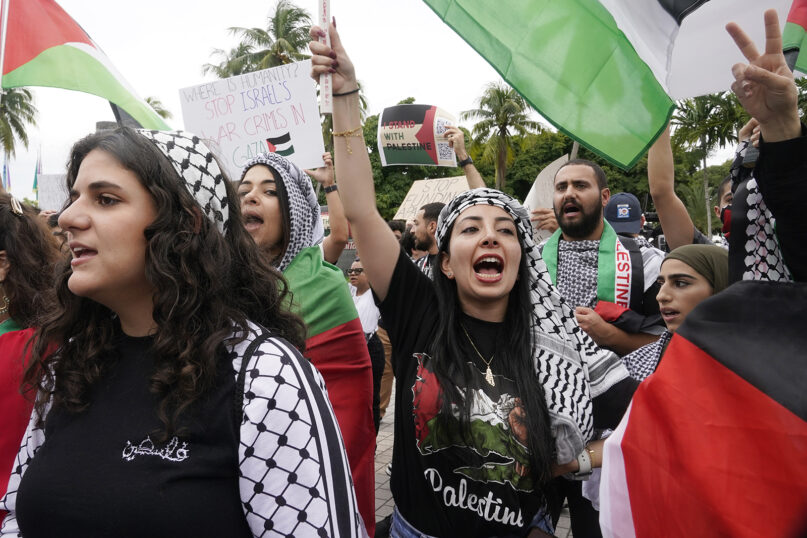
Palestinian supporters rally for Palestinians in Gaza, Friday, Oct. 13, 2023, in Miami. For Palestinian Americans, there’s a sense of helplessness and hopelessness as many struggle to hear from their families in Gaza. Amid a fuel and water shortage, no electricity, and now a forced evacuation in the north, administering and sending aid to civilians in Gaza is near impossible.
(AP Photo/Marta Lavandier, File)
October 23, 2023
By Kathryn Post
(RNS) — When not leading prayers, attending marches or checking on community members, Anwar Arafat, an imam of a large Memphis, Tennessee, mosque, has been glued to his phone. His spare moments are consumed by reading the news and checking WhatsApp for updates from his sprawling Palestinian family in Gaza. So far, none of his family members have been killed. But the situation is only growing more tenuous.
“A lot of families now in Gaza have been dividing themselves up,” said Arafat. “I have three uncles that are there. They’ve divided their kids up among themselves and then they’ve divided where they’re staying, so that if the building is destroyed, the entire family isn’t lost.”
Since Hamas’ Oct. 7 attack on southern Israel and Israel’s retaliatory airstrikes on Gaza, the death toll is reported to be at least 1,400 in Israel and 4,300 in Gaza. Israel’s blockade of the Gaza Strip has left millions of Palestinians without access to basic supplies even as convoys carrying water, food and medical equipment begin to arrive. Tragedies like the destruction of the al-Ahli Hospital and the historic Saint Porphyrios Greek Orthodox Church, both in Gaza City, have added to the devastating loss of life.
As the death toll in Gaza continues to climb, Palestinian Americans across the U.S. are holding teach-ins on the history of Palestine, hosting marches, calling representatives, praying and fundraising in the hopes that they can eventually send supplies to Gaza. Many are doing so amid constant fear and grief.
The Palestinian Americans interviewed for this story reported struggling to sleep and eat. Samar Sakakini, who attends an Antiochian Orthodox church near Canton, Michigan, told RNS she’d been hospitalized due to anxiety over the crisis. Terry Ahwal, who is Catholic and lives near Detroit, described the Palestinian communities near her as experiencing “pure horror and pure terror.”
“It’s complete and utter devastation,” said Hannah Moushabeck, who lives in Massachusetts and is the author of the children’s book “Homeland: My Father Dreams of Palestine.” “You know, we have experienced tragedy before. We have experienced frustration at our government and governments around the world. But this last week has been utterly horrifying and unprecedented to a completely new level.”
Amid the heartbreak, faith communities have been a source of empowerment for many Palestinian Americans. In New Jersey, where roughly 3% of the population is Muslim, mosques across the state have hosted “know your rights” lectures, teach-ins on the Palestinian occupation and prayers specifically for Gaza, according to CAIR-NJ Communications Manager Dina Sayedahmed.
Masjid Al’Nuha in Teaneck, New Jersey, hosted a community healing event on Oct. 12 and a week later hosted a free self-defense class “in light of recent events and heightened hate crimes.”
At Arafat’s mosque in Memphis, where he estimated roughly 1,000 people attend on an average Friday (including, he said, Christian Palestinians who come for the community), people began collecting funds for Gaza “before we even asked.”
“Everybody in the mosque, everybody in our community is affected by this in one way or another,” said Arafat. “Either they have relatives there, or extended relatives and friends, or they have the human, spiritual bond to the people.” The funds will be donated to large charities like United Nations Relief and Works Agency and the Palestine Children’s Relief Fund, he said.
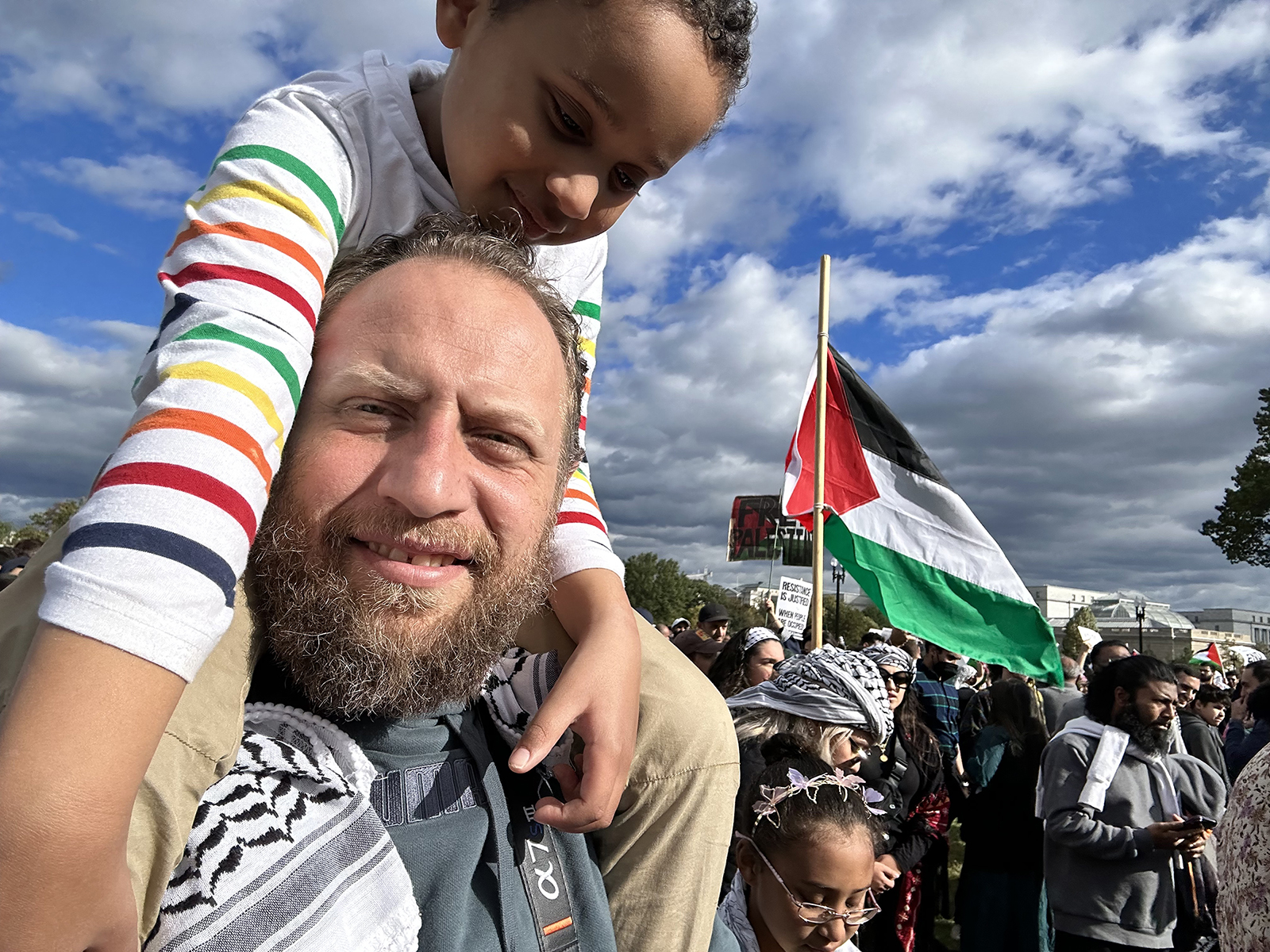
Anwar Arafat holds his youngest son while attending a demonstration in support of Palestinians, Friday, Oct. 20, 2023, in Washington, D.C. Photo courtesy Arafat
Arafat added that his mosque has been encouraging people to call their representatives and has been doing extra supplications for those in Gaza.
“For us, our life is our prayer. And our prayer is our life. We have to act upon the prayer,” he said.
For Arafat, that meant attending national protests in Washington, D.C., on Friday along with a small contingent from his mosque. Marching gives Arafat a way to channel the fear he feels for his family in Gaza as their stockpiles of water and fuel dwindle. Each time a family member leaves for the marketplace to replenish supplies, he told RNS, they say final goodbyes in case they never come back.
“That sense of helplessness, where we can’t do anything, gets slightly alleviated when we’re able to join others who feel the same way,” he observed.
While Arafat was in D.C. on Friday, Walaa Kanan, a social worker and Palestinian American community organizer, was at a public park in Toledo, Ohio, for the latest of several events she has helped coordinate in the last week. A twist on the usual Friday prayer, a local Imam led a jumu’ah sermon and prayer in the park for more than 200 attendees, followed by a protest and march to the office of Marcy Kaptur, the U.S. Representative for Ohio’s ninth district, to call for an end to the violence.
Kanan said she and the other Toledo organizers wanted an event that paired faith and activism. For many Palestinian Americans in the area, the two are inseparable.
“As religious people, we believe in asking God for guidance and strength, all those things, and putting in prayers,” she said. “The flip side of that is also doing what you can on the ground, so combining those two very necessary things.”
While community solidarity has been a source of hope — Kanan said she has been amazed by the turnout at last-minute events for Gaza — local organizers, many of whom are Palestinian themselves, are feeling the weight of compounded stress. Kanan told RNS she has been waking up nauseous and dizzy each morning.
“You still have to go to work. You have to take your kids to school, you have to do whatever it is you have to do,” she said. “So you’re trying to go through those motions while also trying to organize, while also trying to educate, while also experiencing grieving. This is not a time to say, ‘I’m stressed and I can’t.’ People in Gaza need us.”
That support, Kanan said, is not just symbolic.
“I keep saying this: If enough Americans didn’t want genocide to be happening in Gaza it wouldn’t be happening. It’s happening because we’re funding it.”
Biden’s recent trip to Israel has heightened the frustration of many American Palestinians who believe the president’s support of Israel translates to funding the killing of civilians in Gaza. From her vantage point, about 25 miles east of the heavily Arab American community of Dearborn, Michigan, Sakakini believes Biden is going to lose significant votes in the 2024 election. She plans to vote for an independent candidate and knows plenty in the Palestinian American community angered by Biden’s foreign policy.
Ahwal, who is on the executive committee of the American Federation of Ramallah Palestine, is one of them. She called RNS from a metro in D.C. on Thursday on the way to advocate for peace in a meeting at the White House.
“What I cannot comprehend in my life, is how could we, if we want peace, how could we arm the oppressor? It’s absolutely mind boggling,” said Ahwal. “We are very, very sad that Israeli casualties died, because human beings are human beings. We all belong to one human tribe, and for us to use violence is counterproductive.” Ahwal said that colonialism is wrong under any circumstances, and bombing people is never the answer. Instead, people of all faiths should be calling for the killing to end.
Arafat, too, acknowledged that “the loss of civilian life in Israel is precious,” but called out politicians who frame the loss of civilian life in Gaza as “collateral damage” or a “price to pay in order to weed out terror.”
“The double standard is terrible, and we don’t stand for it,” he said.
At a time when despair seems unavoidable, faith is a reassurance for many American Palestinians who feel unmoored by the magnitude of the crisis in Gaza. Kanan said her Muslim faith is both a source of strength and a grounding for her commitment to justice. And for Arafat, faith provides solace when reason and logic fall short.
“I feel so fortunate to be Muslim. Our faith is a very rich faith,” he said. “We are reassured throughout the Quran about the trials and difficulties that we face in this life and the wisdom behind why some of these things might be happening.
I can tell you without a doubt, if we didn’t have that spiritual guidance, I think I’d be losing my mind. Truly, truly, my faith has been the rock that we can stand on.”
Palestinian Americans decry demonization in media amid rising fear of hate crimes
‘This is reminding me a bit of how it felt post-9/11,’ Palestinian activist and policy analyst Laila El-Haddad told Religion News Service.
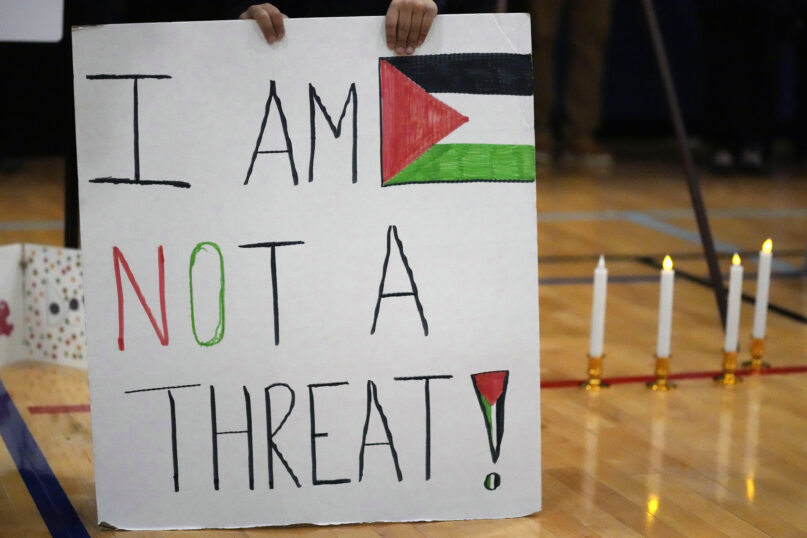
Easton Amjad Waz, 5, holds a sign during a vigil for Wadea Al Fayoume at Prairie Activity and Recreation center in Plainfield, Ill., Tuesday, Oct. 17, 2023. An Illinois landlord accused of fatally stabbing the 6-year-old Muslim boy and seriously wounding his mother was charged with a hate crime after police and relatives said he singled out the victims because of their faith and as a response to the war between Israel and Hamas.
(AP Photo/Nam Y. Huh)
October 18, 2023
By Kathryn Post, Roxanne Stone
(RNS) — Thousands of miles from the crisis in Gaza, Muslims and Palestinians in the U.S. are reporting a wave of Islamophobic incidents that, for many, feels terrifyingly familiar.
“This is reminding me a bit of how it felt post-9/11,” Palestinian activist and policy analyst Laila El-Haddad told Religion News Service on Tuesday afternoon (Oct. 17).
In the days since Hamas attacked southern Israel on Oct. 7 and Israel unleashed retaliatory airstrikes in Gaza, thousands of civilians have been killed. For some Palestinian Americans, the days have been consumed by checking on loved ones in Gaza while also taking precautions for their own safety. Meanwhile, they have watched as some who voice support for the Palestinian civilians trapped in Gaza have been slandered or received threats of their own.
In Pennsylvania, a man was arrested after yelling slurs and wielding a gun at a pro-Palestinian protest. In Los Angeles, UCLA students attending a webinar on the crisis in Gaza were reportedly threatened and called terrorists by a small group of unidentified men. In Boston, the Palestinian Cultural Center for Peace was spray-painted with the word “Nazis.” And with the horrific killing of 6-year-old Wadea Al-Fayoume, a Palestinian American boy stabbed inside his home in a Chicago suburb, all threats are being taken seriously. The landlord of the boy’s mother has been charged with his murder.
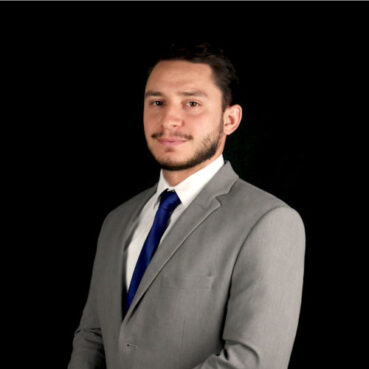
Selaedin Maksut, executive director of the CAIR-NJ. Photo courtesy of CAIR-NJ
It’s not just Palestinian Americans who are being impacted, according to Selaedin Maksut, executive director of the New Jersey chapter of the Council on American-Islamic Relations, who said threats have extended to all Muslims, or people who might be perceived as Muslim or Arab. For example, he said, a South Asian Muslim restaurant owner in South Jersey woke up Friday morning to the Quran being torn apart and scattered in front of her restaurant.
“Because we are so inundated, and the demand is so high, we’ve bypassed our usual intake process and are just trying to help people the best we can for the sake of time,” Maksut said about incidents in New Jersey, where Muslims make up about 3% of the population.
Corey Saylor, the director for research and advocacy at CAIR, confirmed that “without a doubt,” CAIR is seeing a surge of anti-Palestinian and anti-Muslim incidents across the U.S. “I think that’s part of what’s particularly depressing about this moment,” he said. “Recognizing that it is so easy for the Islamophobia switch to go back on.”
El-Haddad blamed one-sided and sloppy media coverage for rendering such a broad and unspecified group of people the targets of anti-Palestinian sentiment in the U.S.
“Disinformation and inaccurate media coverage is deadly for Palestinians, and in the context of America, for Muslim Americans,” said El-Haddad. “So much of it is ingrained in orientalism. … Palestinian becomes Arab becomes Muslim becomes Other.”
From his vantage point in Bethlehem in the West Bank, the Rev. Mitri Raheb said he has watched the coverage of the conflict coming from Western media with increasing alarm.
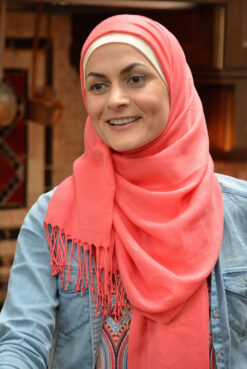
Laila El-Haddad. Photo courtesy of El-Haddad’s website
“You saw yesterday in Chicago how a man stormed a house of a Palestinian Muslim and killed a small child. Because the rhetoric in the media was demonizing Palestinians, so everyone was thinking by doing this, by killing Palestinians, they are doing God’s service,” said Raheb, the founder and president of Dar al-Kalima University in Bethlehem.
“It’s kind of a racist approach. You will not find any journalist in the U.S. asking the Jewish Israeli at the beginning of the interview to start by condemning settler colonialism or genocide against the Palestinians. Or to denounce apartheid. They don’t do it. Only they ask these questions to the Palestinians about condemning Hamas,” said Raheb, a former pastor of the Christmas Lutheran Church in Bethlehem and former president of the Synod of the Evangelical Lutheran Church in Jordan and the Holy Land. Raheb said he will no longer answer these questions when asked by Western media.
“We are asking for balance. So if you ask Palestinians to condemn, ask Israelis to condemn. If you talk about Jewish civilians, talk about Palestinian civilians. If you give face to a Jewish victim, give a face to a Palestinian victim. I mean, that is the least that we can do,” he said.
Some Jewish American groups have vocally shown support for Palestinians, even as antisemitism is also on the rise. Jewish activist groups If Not Now and Jewish Voice for Peace have been “on the ground, shoulder to shoulder” with protesters clamoring for peace in Gaza, according to Maksut, and on Tuesday, over 100 Jewish groups signed a statement condemning “Islamophobia, anti-Arab hate, antisemitism, and all forms of bigotry.”
“It’s incumbent on us to recognize that at a moment when any community is being targeted, even when our own community is being targeted, we have an obligation to speak out just as we hope people speak out for us,” said Amy Spitalnick, CEO of the Jewish Council for Public Affairs, who spearheaded the statement.
RELATED: White House protest leads campaign for a cease-fire before Israeli ground invasion
El-Haddad said it’s been extremely painful to see responses from officials at all levels ignore the plight of Palestinians. Raheb agreed, condemning politicians for furthering harmful one-sided narratives. In recent days, Raheb and El-Haddad have both been inundated by requests to speak to media, colleges, churches and mosques on the conflict and the reality of life for Palestinians in the West Bank and Gaza. In their talks, the long-standing siege on Gaza and occupation of Palestinian territories is front and center.
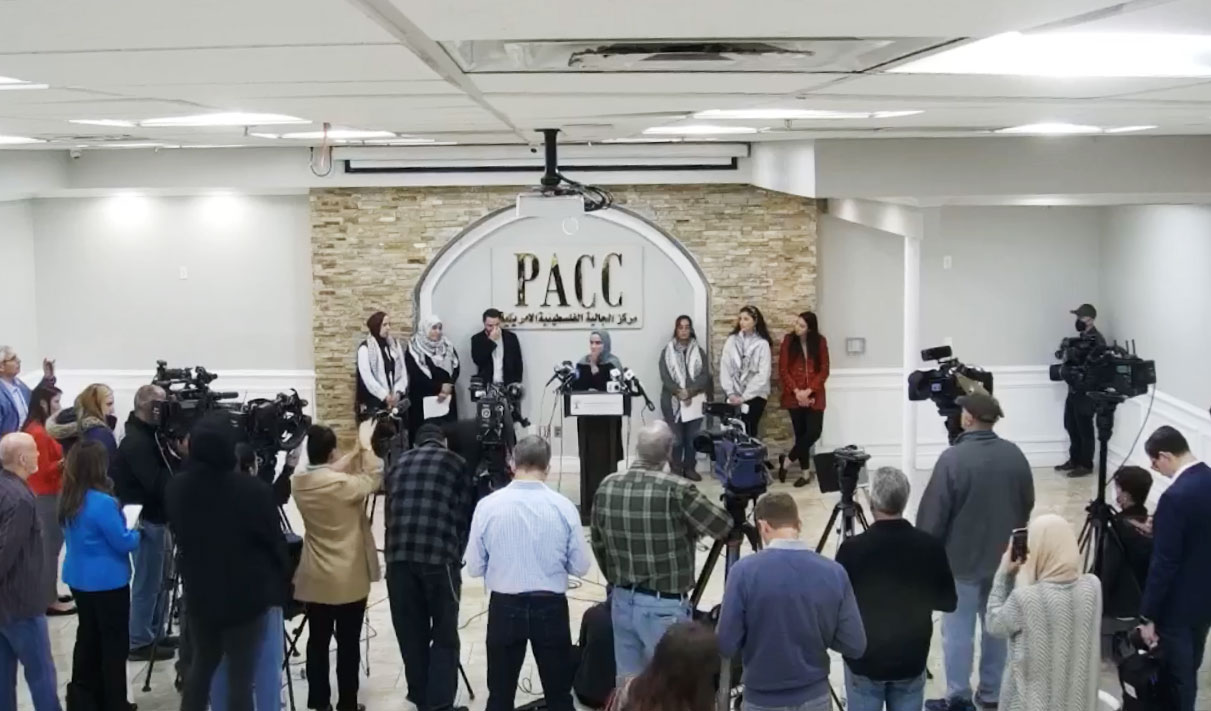
Selaedin Maksut was one of several individuals who recently spoke about rising anti-Palestinian and anti-Muslim bigotry during a news conference at the Palestinian American Community Center in Clifton, N.J. Video screen grab of PACC video
“We’re so shielded from the everyday realities of what Palestinians endure that even among our own Muslim community here in America, there’s a lot of ignorance,” said El-Haddad, who now lives in Maryland. “So I’m finding myself having to simultaneously justify to the media why we are human beings and why we don’t deserve to be killed, while at the same time educating my own community about the situation in between checking in to make sure my family is still alive.”
The author of “Gaza Mom: Palestine, Politics, Parenting, and Everything In Between” and co-author of “The Gaza Kitchen: A Palestinian Culinary Journey,” El-Haddad was featured on the TV series “Parts Unknown” as a guide for Anthony Bourdain in the Gaza Strip and has long worked to humanize life in Gaza.
She has a large extended family living throughout the Gaza Strip and told RNS they are without power and have no working water pumps, so have resorted to bringing in well water and charging phones on small generators.
“They’re just trying to keep it together and cling to any semblance of routine and normality that they can,” she said about her family in Gaza. “They tried to celebrate their daughter’s ninth birthday. They’re trying to put on a brave face. They’re very resilient. Everyone is very strong of faith. We always ask, how do they cope? Faith is a big part of it.”
RELATED: Why you’re not seeing Palestinian suffering
No comments:
Post a Comment